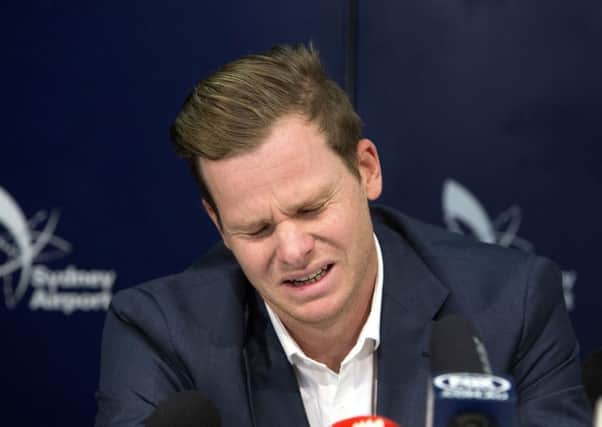Comment: Cricket scandal is latest example of poor player behaviour


I’ve been wondering, too, about the way we treat sporting stars, seeing them for instance as role models for life rather than merely in their sport, and then putting them in the pillory if they fail to live up to the role in which we have cast them. Is this fair? Did any of them set out to be a role model rather than simply the best batsman, fly-half, goalkeeper, tennis player they could be?
Former England cricket captain, Mike Atherton, now one of the very best of sports journalists, is someone who recognizes that ultimately sport isn’t that important. Or, as he puts it, it’s important because it isn’t important. In a piece yesterday he recalled an interview with Smith in which the interviewer arrived at a dead end. Once they had covered the cricket, and what it meant to Smith, there was simply nothing else to talk about. It’s possible for sportsmen to live in a cocoon, which is why it’s important that clubs and the authorities who control sports do all that they can to broaden players’ experience of life outside the bubble. This is something that rugby takes seriously and is quite good at.
Advertisement
Hide AdAdvertisement
Hide AdThis may be partly because committee men and coaches are mostly old enough to have been reared in the amateur days, when players had to find a balance between the the game and their families and work. In other respects however rugby can’t afford to be complacent; it has had its own scandals in the past, the Harlequins’ “Bloodgate” one, for instance, being directly comparable to the Aussie ball-tampering in that the cheating wasn’t done on the spur of the moment by an individual acting foolishly, but followed off-the-field discussion . Likewise there is suspicion that coaches and doctors have sometimes collaborated to seek an advantage from the recent requirement that players suspected of having suffered a head injury must leave the field for examination.
It’s also the case that, in some respects, behaviour on the field is deteriorating. There may, thanks to the presence of cameras and Television Match Officials in the professional game be far less thuggery, but challenges to the referee’s authority and attempts by players to influence his decision are much more frequent than they were even five or six years ago. There are several outstanding and much-admired players whose harassment of referees is deplorable and, sadly, goes unpunished. The introduction of TV replays encourages attempts to twist the referee’s arm. How often when a try has apparently been scored do you see players drawing the referee’s attention to some incident in the build-up and demanding a replay in the hope of getting the try disallowed?
It’s a sad development. The use of technology in sports may mean that fewer mistaken decisions are made, but it hasn’t improved behaviour and it hasn’t ended arguments. It has however rendered the referee’s or umpire’s authority provisional. Instead of players having to accept that the verdict has been delivered, sentence passed and the case closed, they now clamour for an appeal. It is usual now to see half a dozen players surrounding the referee and badgering him. Usually their behaviour goes unpunished. It’s much rarer now than it was a dozen years ago to see the referee wave protests away and march the offending team back ten metres – or indeed reverse a penalty.
Meanwhile, on a happier note, Edinburgh have their European Challenge Cup quarter-final this evening. Richard Cockerill and his fellow coaches have brought Edinburgh an unaccustomed consistency, and playing at home – even if that home is once again the cavernous wasteland of Murrayfield – they will quite rightly start as favourite, all the more so because over recent months they have learned how to hang in and win games coming from behind – games which even in the early weeks of this season one would have expected them to lose. This is perhaps the biggest change. Scottish rugby is on the upsurge, but we’ll know it’s getting close to its target when a Scottish team is comfortable as favourites, and no longer needs the stimulus of being an underdog.